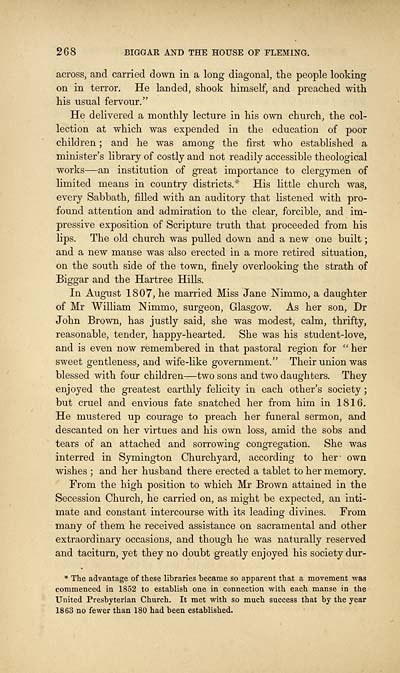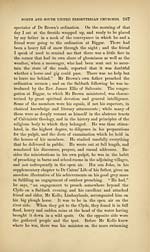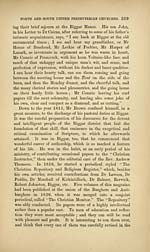Biggar and the House of Fleming
(296) Page 278
Download files
Complete book:
Individual page:
Thumbnail gallery: Grid view | List view

268 BIGGAK AND THE HOUSE OF FLEMING.
across, and carried down in a long diagonal, the people looking
on in terror. He landed, shook himself, and preached with
his usual fervour."
He delivered a monthly lecture in his own church, the col-
lection at which was expended in the education of poor
children ; and he was among the first who established a
minister's library of costly and not readily accessible theological
works — an institution of great importance to clergymen of
limited means in country districts.* His little church was,
every Sabbath, filled with an auditory that listened with pro-
found attention and admiration to the clear, forcible, and im-
pressive exposition of Scripture truth that proceeded from his
lips. The old church was pulled down and a new one built ;
and a new manse was also erected in a more retired situation,
on the south side of the town, finely overlooking the strath of
Biggar and the Hartree Hills.
In August 1807, he married Miss Jane Nimmo, a daughter
of Mr William Nimmo, surgeon, Glasgow. As her son, Dr
John Brown, has justly said, she was modest, calm, thrifty,
reasonable, tender, happy-hearted. She was his student-love,
and is even now remembered in that pastoral region for " her
sweet gentleness, and wife-like government." Their union was
blessed with four children — two sons and two daughters. They
enjoyed the greatest earthly felicity in each other's society ;
but cruel and envious fate snatched her from him in 1816.
He mustered up courage to preach her funeral sermon, and
descanted on her virtues and his own loss, amid the sobs and
tears of an attached and sorrowing congregation. She was
interred in Symington Churchyard, according to her' own
wishes ; and her husband there erected a tablet to her memory.
From the high position to which Mr Brown attained in the
Secession Church, he carried on, as might be expected, an inti-
mate and constant intercourse with its leading divines. From
many of them he received assistance on sacramental and other
extraordinary occasions, and though he was naturally reserved
and taciturn, yet they no doubt greatly enjoyed his society dur-
* The advantage of these libraries became so apparent that a movement was
commenced in 1852 to establish one in connection with each manse in the
United Presbyterian Church. It met with so much success that by the year
1863 no fewer than 180 had been established.
across, and carried down in a long diagonal, the people looking
on in terror. He landed, shook himself, and preached with
his usual fervour."
He delivered a monthly lecture in his own church, the col-
lection at which was expended in the education of poor
children ; and he was among the first who established a
minister's library of costly and not readily accessible theological
works — an institution of great importance to clergymen of
limited means in country districts.* His little church was,
every Sabbath, filled with an auditory that listened with pro-
found attention and admiration to the clear, forcible, and im-
pressive exposition of Scripture truth that proceeded from his
lips. The old church was pulled down and a new one built ;
and a new manse was also erected in a more retired situation,
on the south side of the town, finely overlooking the strath of
Biggar and the Hartree Hills.
In August 1807, he married Miss Jane Nimmo, a daughter
of Mr William Nimmo, surgeon, Glasgow. As her son, Dr
John Brown, has justly said, she was modest, calm, thrifty,
reasonable, tender, happy-hearted. She was his student-love,
and is even now remembered in that pastoral region for " her
sweet gentleness, and wife-like government." Their union was
blessed with four children — two sons and two daughters. They
enjoyed the greatest earthly felicity in each other's society ;
but cruel and envious fate snatched her from him in 1816.
He mustered up courage to preach her funeral sermon, and
descanted on her virtues and his own loss, amid the sobs and
tears of an attached and sorrowing congregation. She was
interred in Symington Churchyard, according to her' own
wishes ; and her husband there erected a tablet to her memory.
From the high position to which Mr Brown attained in the
Secession Church, he carried on, as might be expected, an inti-
mate and constant intercourse with its leading divines. From
many of them he received assistance on sacramental and other
extraordinary occasions, and though he was naturally reserved
and taciturn, yet they no doubt greatly enjoyed his society dur-
* The advantage of these libraries became so apparent that a movement was
commenced in 1852 to establish one in connection with each manse in the
United Presbyterian Church. It met with so much success that by the year
1863 no fewer than 180 had been established.
Set display mode to:
![]() Universal Viewer |
Universal Viewer | ![]() Mirador |
Large image | Transcription
Mirador |
Large image | Transcription
Images and transcriptions on this page, including medium image downloads, may be used under the Creative Commons Attribution 4.0 International Licence unless otherwise stated. ![]()
| Histories of Scottish families > Biggar and the House of Fleming > (296) Page 278 |
|---|
| Permanent URL | https://digital.nls.uk/94842834 |
|---|
| Description | A selection of almost 400 printed items relating to the history of Scottish families, mostly dating from the 19th and early 20th centuries. Includes memoirs, genealogies and clan histories, with a few produced by emigrant families. The earliest family history goes back to AD 916. |
|---|

